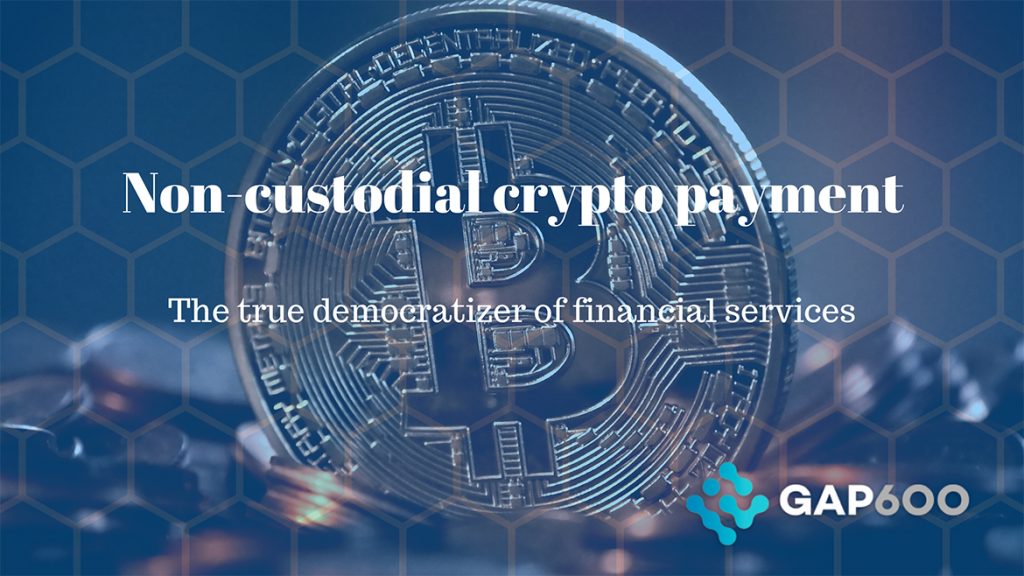Blog
Non-custodial crypto payment services: The true financial democratizer

Cryptocurrencies and the technologies that support their use as a payment method have matured, to the point where they are now disrupting traditional transactional models and established processes.
While the debate rages on whether Bitcoin, Bitcoin Cash or perhaps another cryptocurrency will someday become the single global currency, they are already reframing our thinking around the role of traditional custodial financial services providers.
A traditional financial institution, like a bank, acts in a custodial role, effectively holding a customer’s assets, either in electronic or physical form, while the client maintains ownership of those assets.
In terms of money, this equates to the bank holding a client’s cash deposits to safeguard against theft or loss. Other services can then be provided, such as the ability to transact with that money via a bank-issued card, electronic funds transfer (EFT), cross border payment, or a mobile payment via a linked app.
Credit card payment processing providers fulfil a similar custodial function. However, the regulatory compliance requirements make it administratively onerous for a merchant to implement these forms of transaction enablement, which adds friction to the process and unnecessary layers of complexity, compared to simply setting up a cash till. To make this transactional model viable, a business or online content provider also needs to achieve a certain degree of scale.
To find a suitable alternative, many are looking to cryptocurrencies to disrupt the prevailing payment paradigm. In this regard, many crypto wallets function as a custodian, as the service provider holds a client’s coins in a hot wallet, as well as the private key. In effect, the service provider holds cryptographic control over the client’s cryptocurrency and only a username and password are required to access their digital currency and authorize transactions.
…a new breed of non-custodial payment processing services are starting to revolutionize this payment paradigm
Conversely, non-custodial cryptocurrency services – like Blockchain.com, bitcoin.com, Yours.org, and Cointext – allow the user to keep their private key and their coins. This means they have more control of their cryptocurrency.
As such, cryptocurrencies and a new breed of non-custodial payment processing services are starting to revolutionize this payment paradigm. Non-custodial applications such as The Money Button from Yours.org solve the flow rigidity issues inherent in peer-to-peer (P2P) payments.
This enables the payer and the recipient to transact directly with one another, effectively stripping out all the admin-intensive and bureaucratic middle layers that create the complexity and friction inherent in most other financial transactions. This results in more efficient payments, a better customer experience, and lower costs for users and merchants.

…..enable anyone to accept cryptocurrency payments, as easily as if they were accepting cash at a fete stand
Consider the potential that a P2P ‘pay button’ application offers as a platform for two people to transact. Embedding a button into a website or social media feed that links directly to a non-custodial wallet, such as mycelium or bitcoin.com, would enable anyone to accept cryptocurrency payments, as easily as if they were accepting cash at a fete stand.
A simple click of a button will securely, and immediately, transfer digital currency directly between the two wallets. It’s simple, fast and transparent.
Certainly, merchants could just publish their Bitcoin or Bitcoin Cash address to offer this as a payment option, but this falls short of delivering an exceptional customer experience when accepting crypto payments.
And these non-custodial services also scale better, which will ensure that these applications remain the true democratizer of financial services. It’s a revolutionary concept that has the potential to reshape the digital economy.
The potential is enormous
Anyone will be able to create content, which they can then sell for cash by simply adding a pay button, effectively by-passing the need to apply, install and paying for a credit card processing service – no intermediary services required!
These unique and innovative payment applications will help to grow and sustain sprawling informal online economies; small vendors can create new revenue streams by accepting micro payments online for low value purchases; crowd funding can be democratized. The potential is enormous.
And by adopting this technology, other benefits emerge. According to Ryan Charles, founder of Yours.org and The Money Button, the potential use case of enabling multiple payouts opens a range of payment models, including affiliate referrals and recommendations, none of which require registration with a merchant. And thanks to The Money Button, enabling payments is now as easy as setting up a website – it’s just code.
In contrast, the barriers faced by businesses in accepting cryptocurrency payments are far more complex and, therefore, restrictive. And with complexity comes cost, which means non-custodial payment services will always hold an advantage. As such, they are, and will likely remain, the transactional medium best suited to the true democratization of financial services.

Daniel Lipshitz
Founder & CEO - GAP600 Ltd




